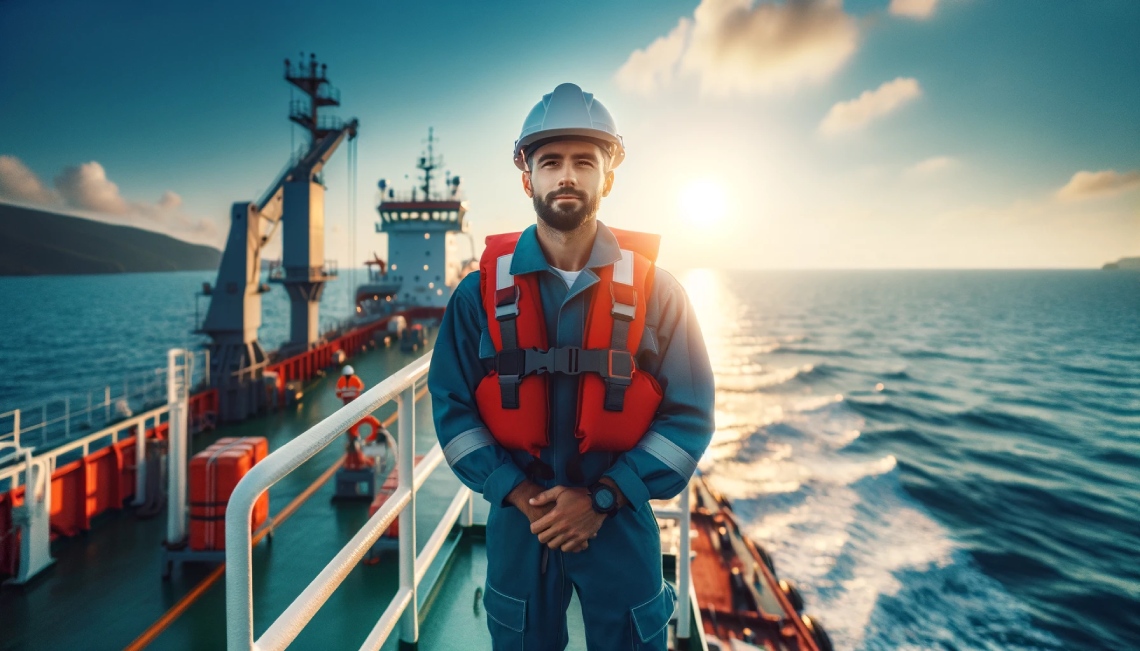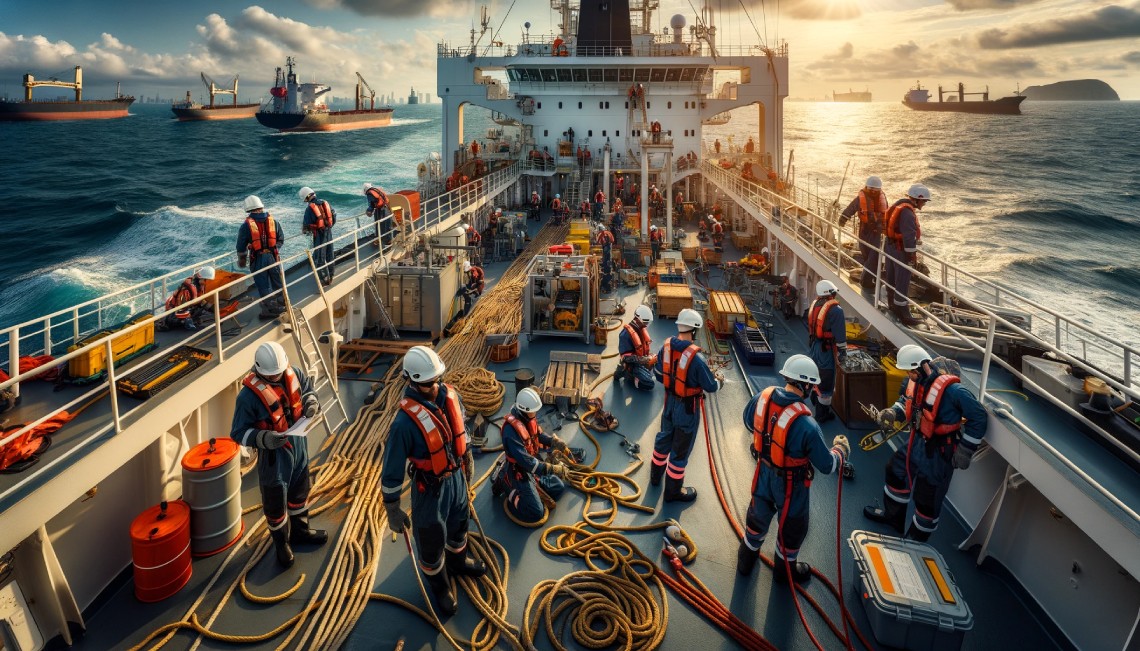Maritime Law
Protection of Seafarers

The topic of today’s article refers to a group of individuals that might seem rare in our country at first thought, considering that Serbia does not have direct access to the sea.
However, Serbia holds a significant and longstanding tradition in the maritime world, currently has a considerable number of active seafarers, employed on cargo ships, cruise liners, yachts, and other commercial vessels worldwide.
In this text, we will look into the protection of seafarers in their workplace.
The question arises: Who can be considered a seafarer?
We can define a seafarer as an individual employed in any capacity on any type of commercial vessel, such as cargo ships, cruise liners, yachts, etc.
Modern seafarers face specific challenges related to complex employment contracts.
Although intricate, these contracts, in most cases, provide minimal protection for seafarers, relying solely on general provisions of the MLC Convention, ratified in Serbia in 2011 and amended in 2013.
Such contracts often fail to adequately protect seafarers’ rights, particularly concerning injuries and death at work, unpaid wages, unauthorized deductions, as well as other aspects related to employment on vessels.
Another issue is the jurisdiction of the courts in event of disputes.
Frequently, employment contracts for seafarers stipulate the jurisdiction of the court of the flag state where the vessel on which the seafarer is engaged is registered.
Considering that most shipowners opt for sailing under so-called flags of convenience (Panama, Liberia, etc.), which lack developed judiciary systems and are difficult for foreign seafarers to access, resolving any problem a seafarer encounters through judicial dispute becomes practically impossible.
The only mechanism for protection is dispute resolution through arbitration, amicable settlement of disputes, i.e., through a settlement directly with the shipowner.
Such a mechanism for seafarer protection is usually disadvantageous, as shipowners, aware that any seafarer would be reluctant to opt for a judicial dispute, exploit this factual situation, paying considerably lesser sums of money to seafarers in cases of compensation, which they would otherwise be entitled to by law.
However, if a seafarer hires a maritime law attorney, shipowners behave differently and approach negotiations with the seafarer more attentively.
Given such a legal position of seafarers, the question arises as to what preventive measures seafarers can take to protect their rights in the event of a potential dispute with the shipowner?
Regular consultation with a maritime law attorney regarding the analysis and negotiation concerning employment contracts can help seafarers ensure fair conditions and compliance with laws. In addition, promptly reporting incidents to an attorney, whether injuries or other problems, help ensure that appropriate action is taken in a timely manner.
Seafarers should carefully keep all relevant documents, including employment contracts, medical reports, and correspondence, in order to have a strong basis for any legal claims.

Due to the complexity of the legal position of seafarers, it is extremely important for seafarers to be aware of their rights and obligations.
It is essential to know how to act in various situations related to working on vessels. Thus, it is important to know the steps to take in the event of injury or death at sea, unpaid wages, unauthorized deductions, etc.
If a seafarer is injured or suffers a death at sea, the process of filing a claim for compensation can be complex and depend on various factors, such as jurisdiction, the nature of the injury or death, the contractual arrangements between the seafarer and the employer, and other relevant factors.
In event of an injury, the priority is to report the injury to the authorities on the vessel as soon as possible. Additionally, it is important for the seafarer, if possible, take several photographs or videos of the place where the injury occurred and gather information about witnesses.
The medical report that the seafarer receives from doctor or the ship’s doctor should be carefully read before signing, ensuring that all information entered is truthful.
In practice, it often happens that local or ship’s doctors do not include everything the seafarer mentioned during the examination in the report. In such cases and in cases of doubt regarding the competence of the doctor, it is important to inform a maritime law attorney without delay, so that appropriate actions can be taken in time.
Among other things, the attorney may request that the seafarer be sent home for treatment, whereby the shipowner is obliged to reimburse the seafarer for the costs of treatment and the agreed compensation in case of disability.
In the event of a death at work, the closest relatives (next of kin) of the seafarer should inform an attorney as soon as possible.
The attorney has the right to request copies of documents related to the fatal event from the shipowner, as well as an accident report. Based on these and other ship documents, the attorney of the deceased’s closest relatives can prepare a compensation claim.
What steps should be taken in the event of overdue wages (wages arrears)?
In case of non-payment or irregular payment of wages, the seafarer may contact the administration of the flag under which the ship sails, one of the international organizations dealing with the issue of seafarer protection at work, or, under certain conditions, port authorities, who can contact the shipowner and demand payment of due but unpaid wages to the seafarers.
These types of seafarers’ protection have proven to be quite effective in practice.
What steps should a seafarer take in case of workplace harassment?
In case of any kind of harassment by coworkers or other individuals on board, seafarers have several mechanisms at their disposal.
The first step in any case is to report the incident and file a complaint with the ship’s master (or the captain or other competent person, depending on the type of vessel – hereinafter referred to as the “competent person”).
If the competent person does not act on the complaint within the stipulated period, they are obliged to forward it to the shipowner for a decision. If the shipowner also does not decide on the complaint within the stipulated period, the seafarer may file a complaint with the flag administration.
In any case, the seafarer can directly submit a complaint to the flag administration if he considers that a complaint to the competent person and the shipowner would be ineffective or, conversely, to local authorities if the ship is in port or anchored in a port anchorage.
Finally, seafarers can also contact international organizations for seafarer labor.
However, seafarers often avoid lodging complaints directly with the company or shipowner because, in practice, it often happens that the shipowner simply dismisses the seafarer from work or transfers the seafarer to another vessel without resolving the disputed situation.
Therefore, it is certainly better to submit a complaint to other authorities through a maritime law attorney.
How to improve seafarers’ rights?
One of the most effective solutions to improve the rights of seafarers in general, and especially seafarers who are citizens of the Republic of Serbia and the Republic of Montenegro, as they have a similar legal status, is to unite seafarers in trade unions and join them to sign a collective agreement.
In Serbia, there are trade unions for seafarers, which improves the status of our seafarers who sail on ships worldwide.
However, the signing of a collective agreement for seafarers in the Republic of Serbia would significantly contribute to greater protection of the rights.
Note: This text does not represent legal advice, but the opinion of the author.





